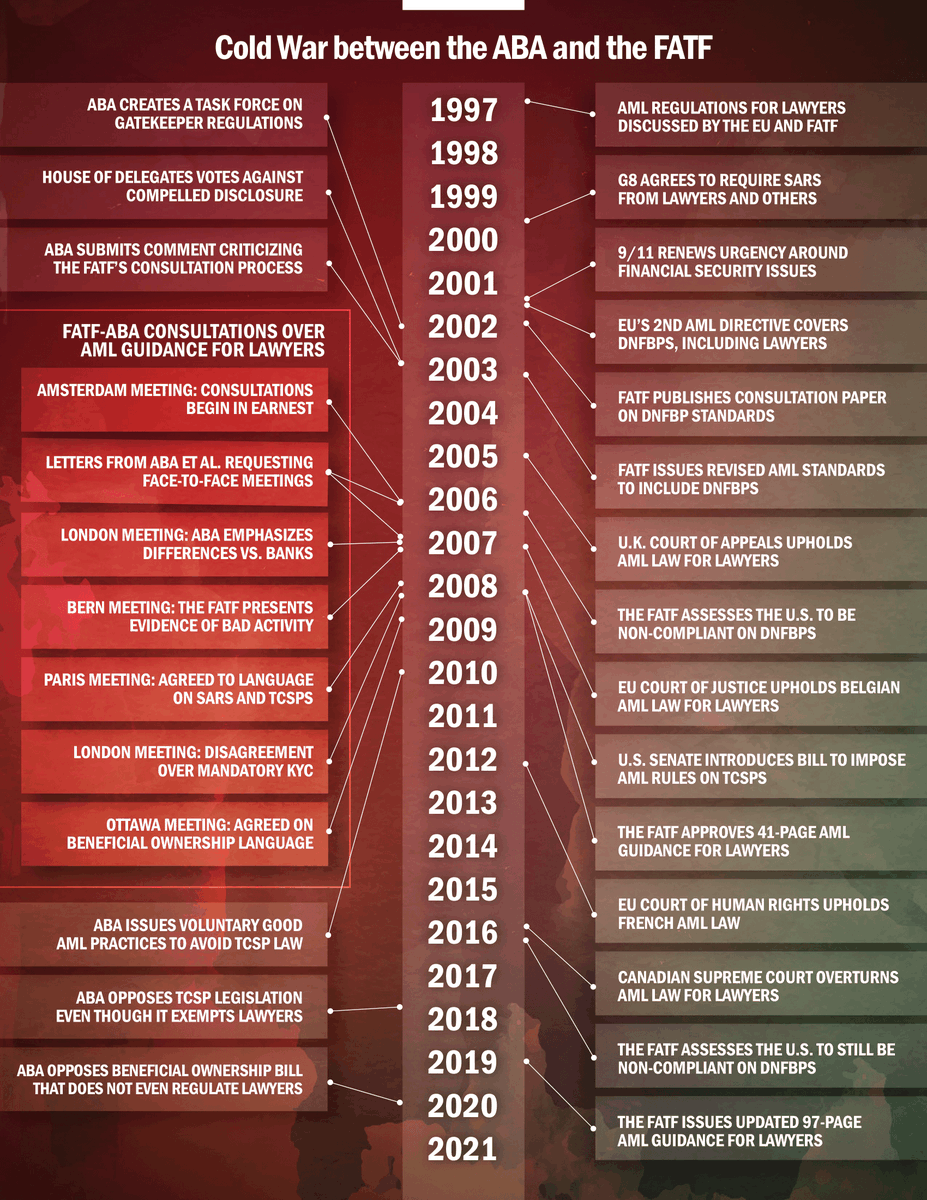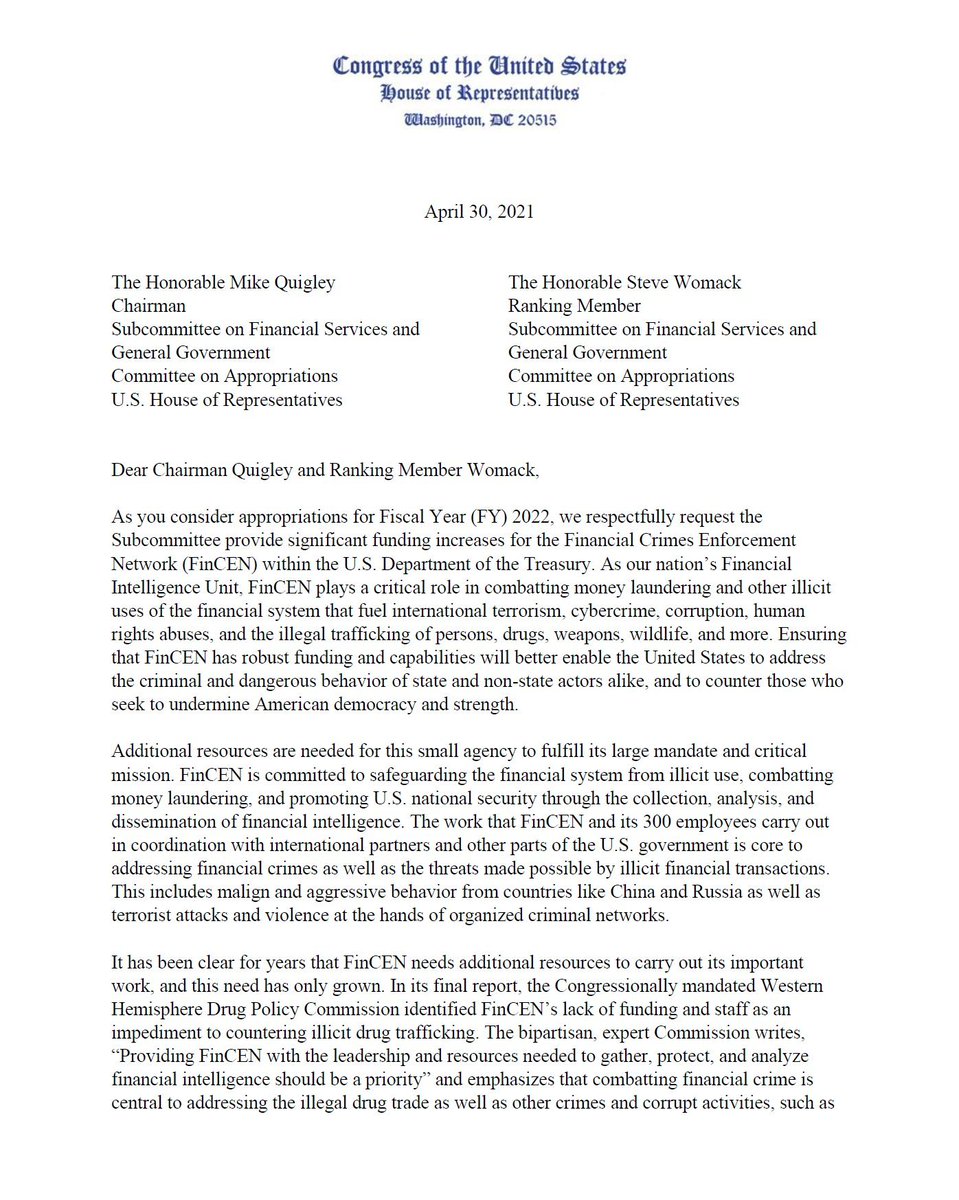
Ten types of U.S. professionals endanger national security by handling dirty money, such as lawyers, realtors, portfolio managers, and art dealers paid by kleptocrats and oligarchs.
Here's how @USTreasury should prioritize regulating enablers. New Report: securingdemocracy.gmfus.org/regulating-the…
Here's how @USTreasury should prioritize regulating enablers. New Report: securingdemocracy.gmfus.org/regulating-the…
This is the first analysis of how @USTreasury should allocate its resources to prioritize the worst enablers.
Five timing factors should inform Treasury’s prioritization:
1⃣ Risk severity
2⃣ Mandatory deadlines
3⃣ Drafting status
4⃣ Regulatory experience
5⃣ Anticipated pushback
Five timing factors should inform Treasury’s prioritization:
1⃣ Risk severity
2⃣ Mandatory deadlines
3⃣ Drafting status
4⃣ Regulatory experience
5⃣ Anticipated pushback

Based on those considerations, @USTreasury should strategically sequence a big regulatory rollout by the end of Biden's term, starting with easy wins (at the summit for democracy) before gauging whether there's political appetite in D.C. to fight the four horsemen of dirty money. 

The key month to launch this mission in earnest is December. In addition to hosting the summit for democracy (Dec. 9-10), the U.S. government will finish Biden's anti-corruption plan (due Dec. 20). On Biden's order, it's supposed to cover the threat of professional enablers (⬇️). 

Rather than limiting itself to statutorily mandated jobs like beneficial ownership and regulating antiquities, @USTreasury should show it means business by announcing at a summit for democracy side event that it'll be issuing new rules in 2022 to cover three sectors of enablers:
1⃣ Private equity and hedge funds
This is the enabler sector that the FBI is most concerned about as a covert financial pathway for adversarial regimes (left image).
@USTreasury should update the rule it drafted in 2015 with eight expansions (right image) and then finalize it.

This is the enabler sector that the FBI is most concerned about as a covert financial pathway for adversarial regimes (left image).
@USTreasury should update the rule it drafted in 2015 with eight expansions (right image) and then finalize it.


2⃣ Real estate title insurers
From mobsters buying Trump condos to a warlord-oligarch buying office buildings in the Midwest, U.S. real estate is a world-leading home for dirty money.
@USTreasury should issue a new rule that would expand geographic targeting orders in six ways.
From mobsters buying Trump condos to a warlord-oligarch buying office buildings in the Midwest, U.S. real estate is a world-leading home for dirty money.
@USTreasury should issue a new rule that would expand geographic targeting orders in six ways.

3⃣ Art dealers
When Russia invaded Ukraine and the U.S. sanctioned Kremlin cronies, email records suggest @ChristiesInc plotted to help the Russians evade sanctions by selling them art (left).
@USTreasury should reach six key findings in its coming study of art markets (right).

When Russia invaded Ukraine and the U.S. sanctioned Kremlin cronies, email records suggest @ChristiesInc plotted to help the Russians evade sanctions by selling them art (left).
@USTreasury should reach six key findings in its coming study of art markets (right).


Unfortunately, even after regulating those three low-hanging fruit, the U.S. will still rank among the less than 10% of nations that are non-compliant with the @FATFNews standard on enablers.
Coming into compliance will require support from Congress to take on the four horsemen.
Coming into compliance will require support from Congress to take on the four horsemen.

For example, the quarter-century Cold War (see image) between the @ABAesq and @FATFNews illustrates why regulating lawyers will require strong support and well-laid legal and political strategies, including advocacy tactics to divide and conquer opponents from within. 

Similarly strong political support is needed to regulate covert PR and marketing firms, which Russia appears to use to launder disinformation against the Pfizer vaccine (left).
In fact, a rapidly growing portion of all disinfo cannot be attributed beyond opaque PR firms (right).

In fact, a rapidly growing portion of all disinfo cannot be attributed beyond opaque PR firms (right).


For Biden's sweeping anti-corruption campaign to succeed, ambitious rhetoric must be matched by strong implementation.
@USTreasury has the tools to get started—and Congress should provide more—making the centerpiece of this mission regulation of enablers. securingdemocracy.gmfus.org/regulating-the…
@USTreasury has the tools to get started—and Congress should provide more—making the centerpiece of this mission regulation of enablers. securingdemocracy.gmfus.org/regulating-the…
• • •
Missing some Tweet in this thread? You can try to
force a refresh



















